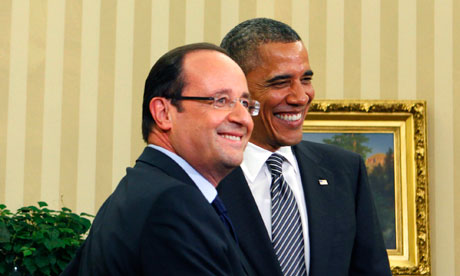After Nicolas Sarkozy lost the French presidential election on May 6, pundits in Washington lamented the loss of this renowned America-phile and close NATO ally, especially coming at the hands of a Socialist successor who pledged a faster pullout from Afghanistan. But Sarkozy's replacement, new French President Francois Hollande, is already proving to be a much more valuable friend to Barack Obama than Sarkozy was. He could even help Obama win in November.
But it's not for the reason the right-wing conspiracy theorists would have you think. No, Hollande and Obama can hardly be said to think alike.
It's just that, with Hollande's election, the balance of power may have shifted in Europe toward more dramatic economic stimulus and other self-saving measures for the eurozone. Within days of his election, Hollande was aggressively pursuing these policies at the G8 summit at Camp David, and he hasn't stopped talking and pushing since. Obama badly needs this support right now, as America's oh-so-tentative economic growth finds itself newly jeopardized by the imminent peril of eurozone implosion, as well as slowdown in other major countries such as China.
With the news that U.S. jobless numbers were worse than expected the last three months, and the unemployment rate is back up to 8.2 percent, nothing may be more important to Obama's election chances than the decisions made over the next days and weeks in Europe, especially at the planned EU Summit on June 22, which comes several days after the critical Greek elections. And here the president's worst adversary is Angela Merkel, the German chancellor, and his best friend is clearly Hollande.
Hollande and other pro-growth governments in Europe effectively now have Germany surrounded policy-wise -- because of its lone commitment to austerity and a pared-down role for the European Central Bank -- even though they don't seem to be succeeding as yet in changing Merkel's mind.
Merkel is worried about German public opinion, which remains mulishly against bailouts, ahead of next year's election. But it seems likely she can hold out against her euro partners in such an uncompromising way for only so long. As Der Spiegel noted after the EU summit late last month, "Merkel's world had been turned upside down. For the first time in years, the chancellor did not set the tone at an EU summit."
Thus, despite the current pessimism of the markets, it is not unreasonable to expect a grand compromise along the lines of Germany accepting a larger bailout role for the Deutschebank- dominated ECB, while France in turn accepts part of what it has long resisted: greater fiscal coordination to enforce discipline in national budgets, which Merkel wants to institutionalize.
All of which, if it happens, would add just a little relief to President Obama's life. Thanks to Francois Hollande.

No comments:
Post a Comment